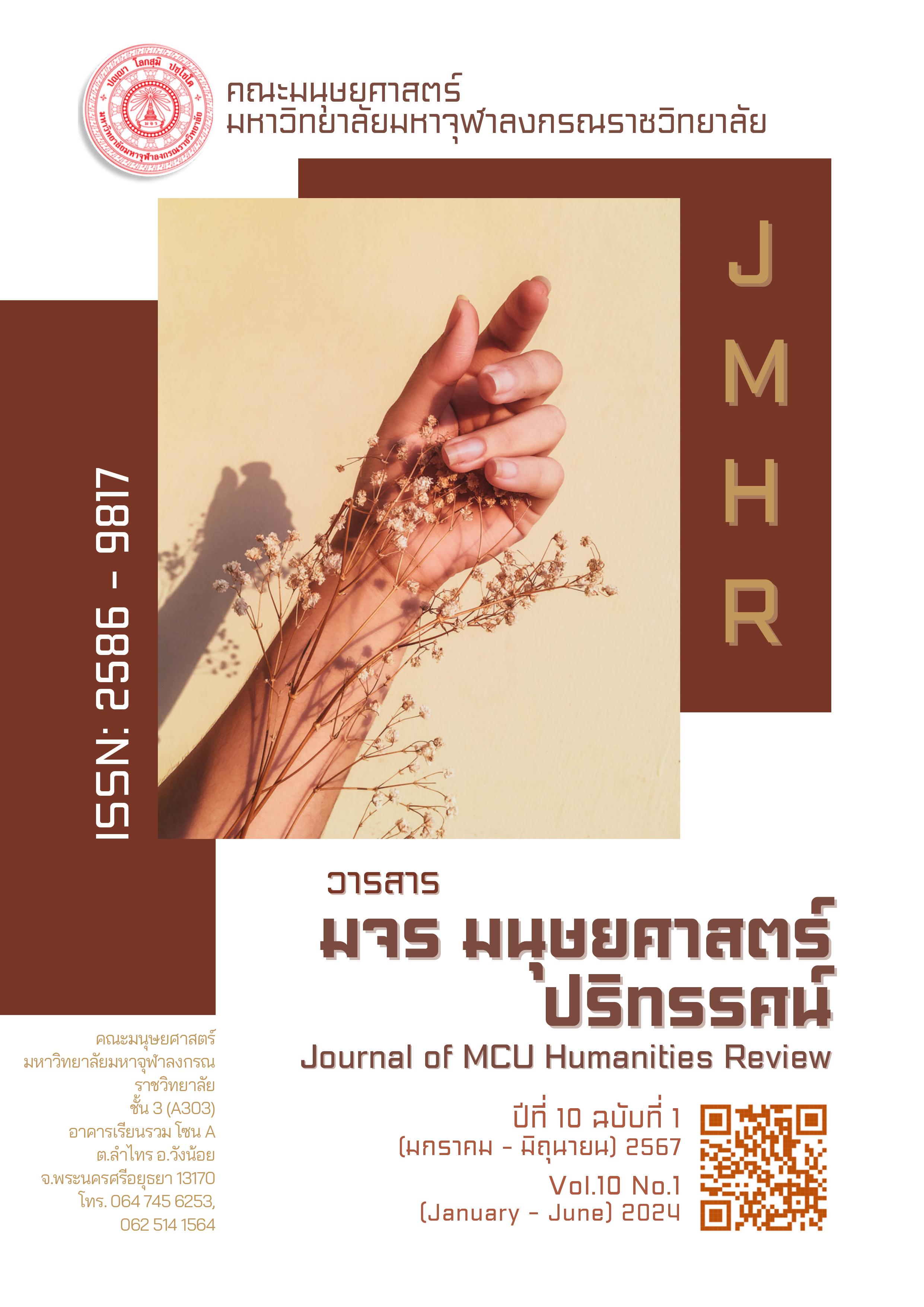วัตถุนิยม : ความจริงเชิงเปรียบระหว่างคุณค่าแท้ คุณค่าเทียม
คำสำคัญ:
วัตถุนิยม, คุณค่าแท้, คุณค่าเทียม, ความจริงเชิงเปรียบเทียบบทคัดย่อ
วัตถุนิยมเป็นมุมมองทางปรัชญาที่เจาะลึกถึงความสัมพันธ์อย่างซับซ้อนระหว่างวัตถุที่สามารถมองเห็น จับต้องได้และความหมายเชิงนามธรรมของวัตถุนั้นภายใต้โครงสร้างสังคมของการดำรงอยู่ของมนุษย์ ความเชื่อมโยงดังกล่าวมีรากฐานมาจากความคิดที่ว่าโลกทางกายภาพหรือโลกของวัตถุ คือ ความเป็นจริงที่มีรูปร่าง เห็น จับต้องได้และทำหน้าที่เป็นสะพานเชื่อมโยงคุณลักษณะด้านรูปธรรม ทำให้เกิดความต้องการครอบครองวัตถุนั้นและใช้วัตถุนั้นแสดงความหมายเชิงสัญลักษณ์ตามที่สังคมได้กำหนดและให้มูลค่า ในยุคที่คนในสังคมหลงไหล ให้ราคาวัตถุสิ่งของมากกว่าประโยชน์แท้และเพิ่มมูลค่าเชิงนามธรรมเพื่อโน้มน้าวให้เกิดความต้องการ อยากได้ กระทั่งต้องดิ้นรนแสวงหาและแย่งชิงมาครอบครองด้วยการการเบียดเบียนและสร้างความขัดแย้ง ดังนั้นความคิด ความเข้าใจคุณค่าแท้ คุณค่าเทียมของวัตถุจึงมีความสำคัญและสามารถนำไปสู่การแสวงหาคำตอบด้านคุณค่าแท้ตามธรรมชาติ เพื่อการครอบครองวัตถุตามความจำเป็นและสมควร ไม่ใช่ดิ้นรนเพื่อครอบครองวัตถุตามกระแสความนิยมทางสังคมที่มักจะมีวัตถุประสงค์แฝงอยู่ หรือมีเป้าหมายการครอบครองเกินประโยชน์เดิมของวัตถุดังกล่าว วิธีคิดแบบคุณค่าแท้หรือคุณค่าเทียมจะเป็นหนึ่งหนทางที่ทำให้เห็นถึงเนื้อแท้ ความสำคัญ รู้ความจำเป็นในการแสวงหาเพื่อให้ได้มาวัตถุสิ่งของต่าง ๆ บนฐานความคิดพิจารณาอย่างมีเหตุผล เห็นประโยชน์แท้หรือคุณค่าแท้ของวัตถุที่ตนต้องการ หรือเห็นคุณค่าตามความจำเป็นอย่างแท้จริง ความเห็นนั้นจะส่งผลต่อพฤติกรรมการบริโภคอย่างเหมาะสมของบุคคล สร้างสมดุลคุณค่าแก่ตนเอง เข้าใจกระแสสังคมและช่วยสร้างทิศทางสังคม
เอกสารอ้างอิง
นาม ศิริเสถียร. (2551). ท่านพุทธทาส. สืบค้น 23 กุมภาพันธ์ 2567, จาก https://citly.me/ib7AZ
ธนาคารไทยพาณิชย์ จำกัด (มหาชน). (2565). เป็นหนี้บัตรเครดิต แก้ไขอย่างไร. สืบค้น 25 กุมภาพันธ์ 2567, จาก https://www.scb.co.th/th/personal-banking/stories/tips-for-you/credit-card-debt.html
ธนาคารแห่งประเทศไทย. (2566). แนวทางการแก้ปัญหาหนี้ครัวเรือนอย่างยั่งยืน. สืบค้น 25 กุมภาพันธ์ 2567, จาก https://app.bot.or.th/landscape/files/household-debt-th.pdf
พุทธทาสภิกขุ. (2549). ปณิธาน 3 ประการ. กรุงเทพฯ: สำนักพิมพ์ธรรมสภา.
สมเด็จพระพุทธโฆษาจารย์ (ป. อ. ปยุตฺโต). (2539). พุทธธรรมกับปรัชญาการศึกษาไทยในยุคโลกาภิวัตน์. นนทบุรี: SR Printing.
“________”. (2564). พุทธธรรมฉบับปรับขยาย. กรุงเทพฯ: โรงพิมพ์ บริษัท สหธรรมิก จำกัด.
American Psychological Association Dictionary of Psychology. Materialism. (2024). Retrieved February 25, 2024, from https://dictionary.apa.org/Materialism
Collins Dictionary. (2024). Materialism. Retrieved February 25, 2024, from https://www.collinsdictionary.com/dictionary/english/materialism
Dictionary. (2024). Materialism. Retrieved February 25, 2024, from https://www.dictionary.com/browse/materialism
Joannes Asikaogu, (2018). A Critical Review of Aristotle's view on Human sociality. International Journal of Humanities, Social Sciences & Work Place Ergonomics in Africa, 11(4&5), 37-48.
Longman Dictionary. (2024). Materialism. Retrieved February 25, 2024, from https://www.ldoceonline.com/dictionary/materialism.
Merriam-Webster Dictionary. (2024). Materialism. Retrieved February 25, 2024, from https://www.merriam-webster.com/dictionary/materialism
ดาวน์โหลด
เผยแพร่แล้ว
รูปแบบการอ้างอิง
ฉบับ
ประเภทบทความ
หมวดหมู่
สัญญาอนุญาต
ลิขสิทธิ์ (c) 2024 วารสาร มจร มนุษยศาสตร์ปริทรรศน์

อนุญาตภายใต้เงื่อนไข Creative Commons Attribution-NonCommercial-NoDerivatives 4.0 International License.






